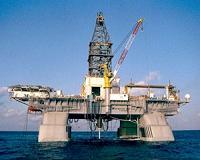 |
London (AFP) July 25, 2010 BP will sacrifice embattled chief executive Tony Hayward within days as it tries to rebuild its image in the aftermath of the Gulf of Mexico oil disaster, reports said Sunday. The BBC said Hayward was negotiating his exit and an announcement was likely by Monday when the BP board meets ahead of second quarter results expected to reveal a 30-billion-dollar provision for paying for the disaster. In the Gulf, US oil spill chief Thad Allen said BP's long-awaited operation to permanently plug the leaking Gulf of Mexico well had been delayed until the week beginning August 2. Originally expected as early as Tuesday, Allen said nothing major had happened to force the delay, it was just a "refined and revised" timeline from BP as it redeploys vessels and personnel following a recent storm. The leak was sealed 10 days ago with a giant cap, but up to four million barrels (170 million gallons) of crude had already spewed into the sea since a deadly rig explosion in April. Toxic crude has washed up on the shores of all five US states on the Gulf Coast and vital tourism, fishing and oil industries in the region have been decimated by the disaster. BP is facing a lengthy claims process and hundreds of lawsuits are pending against the British energy giant, not to mention hearings into the cause of the initial April 20 blast that should determine eventual liability. The BBC report, which quotes a senior BP source, said there was a "strong likelihood" Bob Dudley, who took over the day-to-day management of the spill response from the Hayward last month, would be his replacement. The Sunday Telegraph said there could be wrangling over Hayward's severance package, under which he is likely to be paid a minimum figure of just over one million pounds (1.5 million dollars, 1.2 million euros). Asked about the BBC report, a BP spokesman told AFP he would not comment on speculation. He added: "Tony Hayward is our chief executive. He has the full support of the board and management." A series of gaffes stretching back to the weeks after the BP-leased Deepwater Horizon exploration rig exploded and sank in April has made Hayward a deeply unpopular figure in the United States. He enraged residents of the stricken Gulf states when he said in an interview with Britain's Sky News on May 18: "I think the environmental impact of this disaster is likely to be very, very modest." Then on May 30 he was seen as particularly insensitive to the families of 11 US rig workers who died in the initial blast when he said he wanted the disaster over with so he could have his life back. His pariah status was confirmed when he took part in a yacht race in June, prompting President Barack Obama's chief of staff Rahm Emanuel to say it had "just been part of a long line of PR gaffes and mistakes." His resignation would be seen as a sign BP is keen to draw a line under the disaster and start trying to rebuild its shattered image -- but that will be particularly difficult in the United States. Accused of constantly trying to play down the impact of the disaster to minimize its liability, BP has recently found itself in the cross-hairs of a totally separate scandal. The US Senate is examining claims by US lawmakers that BP pressured the British government for the Lockerbie bomber's release amid anger he remains alive in Libya almost a year after being released on compassionate grounds. BP's efforts to permanently resolve the oil disaster in the Gulf were threatened last week by Tropical Storm Bonnie, but an evacuation was short-lived as the system weakened and ships and drilling rigs are now back on site. BP and US officials plan two operations to kill the well. The first, a "static kill," involves pumping heavy drilling fluid known as "mud" from the top of the well. A week later, using a similar process, the drilling fluid, which is denser than oil, will be pumped via a relief well deep under the seabed, checking the flow of crude and allowing the reservoir to be sealed with cement. Before either can begin, the last section of the relief well must be secured with a 3,000-foot (900-meter) piece of casing, which has to be cemented in place. Allen said the storm had delayed operations: "Regarding the overall impact, we're still working on that to revise it, but I would say probably about seven to nine days total moving to the right."
Share This Article With Planet Earth
Related Links Powering The World in the 21st Century at Energy-Daily.com
 Alarm on Gulf oil rig muted before blast: witness
Alarm on Gulf oil rig muted before blast: witnessNew Orleans (AFP) July 23, 2010 An alarm that should have alerted workers on the Deepwater Horizon oil rig to a deadly build-up of gas that sank the platform, sparking a huge oil spill, had been muted months before, a former rig worker said Friday. The alarm system which uses lights and alarms to warn of fire or high-levels of toxic or explosive gases, had been "inhibited," Mike Williams, the chief electronics technician o ... read more |
|
| The content herein, unless otherwise known to be public domain, are Copyright 1995-2010 - SpaceDaily. AFP and UPI Wire Stories are copyright Agence France-Presse and United Press International. ESA Portal Reports are copyright European Space Agency. All NASA sourced material is public domain. Additional copyrights may apply in whole or part to other bona fide parties. Advertising does not imply endorsement,agreement or approval of any opinions, statements or information provided by SpaceDaily on any Web page published or hosted by SpaceDaily. Privacy Statement |